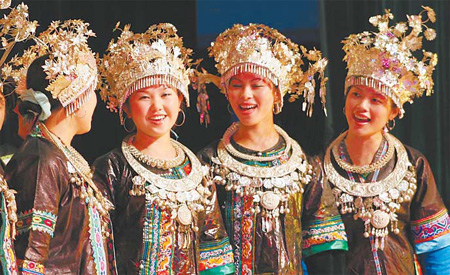more>>More News
- National Day
- ways to integrate into Chinese style life
- Should they be in the same university with me?!!
- Chinese Ping Pang Legend: the Sun Will Never Set
- A Glance of those Funny University Associations
- mahjong----The game of a brand new sexy
- Magpie Festival
- Park Shares Zongzi for Dragon Boat Festival
- Yue Fei —— Great Hero
- Mei Lanfang——Master of Peking Opera
The most beautiful voice in the world: Dongzu dage
By admin on 2014-12-22
Every Dong person knows the saying, "Rice is for the body; song is for the soul".
They take great pride in their "grand songs (dongzu dage)", or "galao" in the local language - the only polyphonic chorus without accompaniment or conductors in China.
"Singing offers the chance to reveal our innermost feelings," says Yang Huanying, a local galao vocalist living in Tongdao Dong autonomous county in southern Hunan province.
"You can't say you are a Dong person if you can't sing."
Yang has become a local celebrity. In 2006, she performed grand songs with her family for CCTV's China Stage (Shenzhou Dawutai). Their pure voices stunned the audience and won them first prize. Domestic tourists got to know about the beautiful folk art and began visiting Dong villages to see live shows.
Galao originated in the Song Dynasty (960-1279) and UNESCO recently listed it as an Intangible Culture Heritage.
But the outside world has known about the grand songs for a long time. Chinese musicologist Zheng Lucheng (1918-76) discovered the art form in the late 1950s. He was shocked to discover the Dong were singing polyphonic music, which had never been identified among the musical forms indigenous to China.
His discovery caught the attention of French musician Louis Dandelaire. In 1986, he invited a choir of nine Dong women to the Paris Autumn Festival. The harmonious sound was praised as "the chorus from heaven".
Dong choral groups are traditionally formed among a family. They create songs by mimicking the sounds of birds and streams, and add their emotions to the melodies. They express feelings openly, especially with love songs.
"In the old days, young people sang to each other when they were courting," Yang says.
"If a young man can't sing in a Dong village, he can hardly find a girlfriend."
Grand songs typically have one of four meanings. The "narrative style" tells of everyday happenings and conversations. The "lyrical style" is reserved for love songs. The "moral style" deals with questions of right and wrong. And the "vocal style" focuses more on the beauty of the melodies than on meaning.
"We Dong will naturally burst into song while doing house chores and working in the fields," Yang says.
"If someone starts to sing, people working nearby will soon join in."
Yang says the grand songs play an important role in passing down culture. Because the Dong don't have a written language, they use singing to preserve their oral history.
Consequently, those who are good vocalists are respected as the brightest and most sensible people.
"Singing together isn't just a form of entertainment, but also a means of educating and uniting the Dong," says Ou Ruifan, an official from the autonomous county's culture bureau.
"It nurtures a sense of belonging and serves as a culture symbol for us."
But Ou explains the songs are in danger of being lost forever. Most of the best vocalists today are in their 30s and 40s. As the younger generation seeks jobs outside of the village, its members rarely find time to learn these traditional tunes.
Ou was once a teacher of Dong culture and language, and continues striving to preserve the ethnic group's traditions.
Two years ago, grand songs and dances collected from Dong villages began appearing in local schools' curriculums.
"The grand songs express the life philosophy and knowledge of the Dong people," Ou says.
"They are filled with passion and sincerity about nature and life. We would love to share them with more people."
Dong people always have music in their hearts and on their
lips 
- Contact Us
-
Tel:
0086-571-88165708
0086-571-88165512E-mail:
admission@cuecc.com
- About Us
- Who We Are What we do Why CUECC How to Apply
- Address
- Study in China TESOL in China
Hangzhou Jiaoyu Science and Technology Co.LTD.
Copyright 2003-2024, All rights reserved




 Chinese
Chinese
 English
English
 Korean
Korean
 Japanese
Japanese
 French
French
 Russian
Russian
 Vietnamese
Vietnamese
